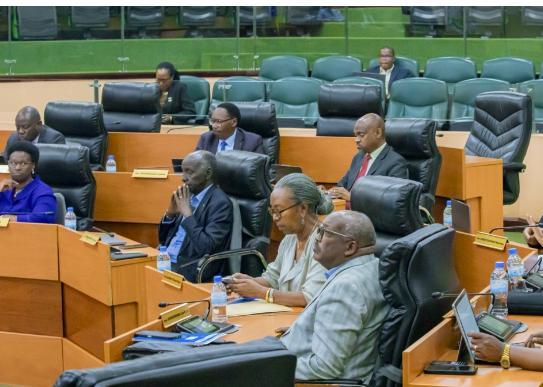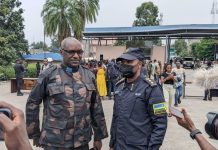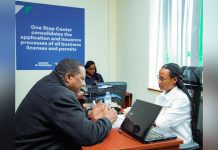Africa-Press – Rwanda. The Senate has called for a reform of how Kinyarwanda and Rwandan culture are taught to citizens living abroad, stressing the importance of modernized curricula, better coordination among institutions, and stronger parental engagement.
This was highlighted on Monday, October 6, as the Senate Committee on Foreign Affairs, Cooperation, and Security, presented a report on challenges in current teaching materials and methods for Kinyarwanda in foreign countries. Among others, the report noted that many of the current materials were designed without consideration for learners’ age groups.
“Parents’ participation in teaching their children Kinyarwanda, and in transmitting values and culture, remains inadequate, said Senator Hadija Ndangiza Murangwa, who chairs the committee.
“Programs such as Itorero Indangamirwa have been instrumental in bringing young people from the diaspora to Rwanda to learn about national values, but more still needs to be done to reach those who cannot travel.”
According to the Committee’s findings, while several Rwandans abroad have established schools and cultural centers teaching Kinyarwanda, traditional dance, and Rwandan history, there is still a lack of coordination among key institutions.
“There are instances where one institution implements a program without the knowledge of others,” Murangwa said. “We need a harmonized framework for cooperation to ensure that Rwandans abroad, especially the youth, have access to coherent and updated materials on culture and history.”
The report emphasized that teaching materials must be restructured according to learners’ age and proficiency levels.
“The way a four-year-old learns the language cannot be the same as a twelve-year-old,” Murangwa explained.
She noted that over 2,500 books have already been distributed to Rwandan embassies worldwide and that a digital application was created to improve access to resources.
“In the next three years, we expect to increase the number of schools teaching Kinyarwanda and culture abroad from 25 to 50 and there should be separate programmes for children and parents so that each group learns in ways that suit their needs,” she added.
Senator Pélagie Uwera echoed the need for standardized learning materials.
“We must avoid a situation where everyone teaches Kinyarwanda in their own way, families abroad should also nurture the culture of speaking Kinyarwanda daily at home,” she said.
Senator Télesphore Ngarambe argued that embassies should promote language and culture learning through cultural festivals, traditional dance competitions, and youth contests.
“Such events can attract young people and make learning more engaging,” he added.
Senator Penina Uwimbabazi pointed out that due to Rwanda’s historical background, some parents in the diaspora do not speak Kinyarwanda, which makes it difficult to teach their children.
“We need to consider these parents in our programmes. One solution could be involving young Rwandans or students who travel abroad to help teach Kinyarwanda and Rwandan culture to diaspora families,” said Uwimbabazi.
Senator Amandin Rugira estimated that the total number of people targeted by the programme could reach around 500,000 globally.
“The data is not always precise since not everyone engages with embassies, but we know that interest is growing, especially through initiatives like sports events in Virginia, USA, where youth come together to play and then attend cultural learning sessions, ” he noted.
Senator Jean Pierre Dusingizemungu cautioned that teaching Rwandan history, particularly about the 1994 Genocide against the Tutsi, requires careful attention in order to avoid misleading or denialist narratives in the content.
“Educators must receive proper and continuous training, including methodological guidance, because misinformation abroad can distort historical truth,” he warned.
The Committee proposed the establishment of Itorero civic programmes held abroad for those unable to come to Rwanda, the expansion of digital learning tools, and the use of sports and arts as platforms for cultural education.
The Senators also called for increased efforts in cultural diplomacy to strengthen Rwanda’s image internationally while fostering unity among diaspora communities.
“We should continue to prepare and support Rwandan cultural exhibitions that teach history and celebrate our identity, embassies and diaspora organizations that can use modern media platforms such as YouTube, TikTok, and podcasts to engage young Rwandans in learning about their heritage,” the Committee recommended.
Rwanda Community Abroad (RCA) units work daily with Rwandans abroad to provide services and strengthen cultural ties.
Rwanda’s diaspora, now organized in 68 associations across Africa, Europe, Asia, America, and Oceania, plays a growing role in promoting national development through investment, knowledge exchange, and advocacy.
Senators reaffirmed that preserving Rwanda’s language, culture, and history among citizens abroad is not just a matter of identity but also a vital link to the nation’s unity and development.
“When Rwandans abroad speak their language, live according to their values, and understand their history, they remain truly connected to their homeland, wherever they are,” said Senator Murangwa.
For More News And Analysis About Rwanda Follow Africa-Press






